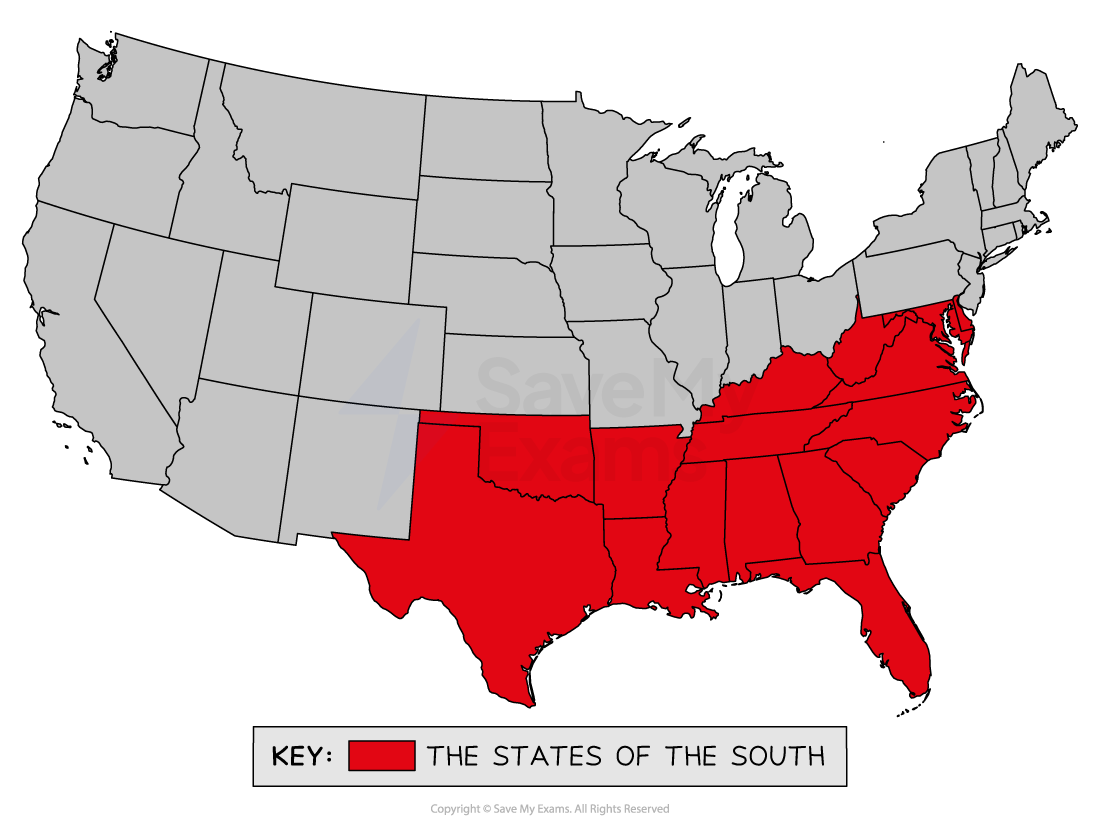Segregation & Discrimination (Edexcel GCSE History): Revision Note
Exam code: 1HI0
Summary
In the 1950s, Black Americans had fewer rights and opportunities and a lower quality of life than White Americans. Nearly all Black Americans were the descendants of enslaved people who were brought to America from Africa against their will. Enslaved Black Americans had been bought, sold to White Americans and forced to work on enormous farms called plantations in the Southern States.
During the 1860s, the Southern States lost the American Civil War to the Northern States. As a result, in 1865, enslavement was outlawed throughout the United States. However, Black Americans continued to suffer from terrible prejudice and discrimination. Black Americans' lives were usually segregated from White Americans - especially in the South. This prejudice and discrimination affected Black Americans socially, economically and, through the ‘Jim Crow’ laws, politically.

What does segregation mean?
Segregation means separate
In the South of the USA in the 1950s, Black and White Americans were kept separate or segregated
They were prevented from mixing in most Southern States
Black and White Americans:
Attended different schools
Accessed different public facilities such as buses, cinemas, restaurants, hotels, beaches, waiting rooms and toilets
The Jim Crow Laws and segregation in the South
The ‘Jim Crow’ laws were a series of laws that only applied to Black Americans which affected peoples’ voting rights and enabled segregation in some Southern states
The laws were named after an offensive slang term used to describe Black Americans
Segregation
The South had a long history of using enslaved Black Americans to work on large, White-owned farms known as plantations
Slavery was abolished but the racist attitudes continued to be widely held
Segregation was legally enforced in the South so that White Americans living there did not have to mix with Black Americans in the South
This was the result of an 1896 court case known as Plessy versus Ferguson
The case ruled that it was legal to segregate Black and White Americans if the facilities were ‘separate but equal’
In reality, the facilities for White Americans were better than those available to Black Americans
Voting rights
In theory, Black Americans had been guaranteed the same voting rights as White Americans since 1870
Black Americans were a sizeable minority in many states in the South, making up 45% of the population of Mississippi in the 1950s
Therefore, they should have been able to vote politicians into power who would improve their lives and end segregation
However, Black Americans’ voting rights were greatly affected by ‘Jim Crow’ laws passed by some states in the South
The ‘Jim Crow’ state laws stopped Black Americans from voting
How the Jim Crow Laws prevented Black Americans from voting
‘Jim Crow’ State Law | Impact |
|---|---|
Literacy Test | Black Americans, who received a worse education than white Americans, had to pass a difficult test before they could vote |
Grandfather Clause | Black Americans who had grandparents who had been enslaved before the Civil War had to register in order to vote |
Voter Registration Office Opening Times | When the descendants of formerly enslaved people attempted to register, they often found that the office was closed |
Poll Tax | Black Americans had to pay a tax before they could vote which many could not afford |
As well as having different voting rights, Black Americans in the South also suffered from violent attacks
Often Black Americans were threatened with losing their jobs if they tried to vote
The result was that, by 1964, just 6.7% of Black people who were eligible to vote in Mississippi were registered
What does discrimination mean?
Discrimination means to treat people differently, usually worse, because they belong to a certain ethnic group, class or gender
Discrimination meant that Black Americans’ lives were very different from White Americans’ lives in the 1950s
Discrimination against Black Americans in the 1950s
Black Americans suffered from economic discrimination in the following ways:
They were paid lower wages than White Americans
Only being hired for menial jobs
Being the first to get fired when jobs were cut
Socially, Black Americans were discriminated against because they:
Lived in overcrowded and poor-quality housing
Were prevented from living in ‘White Neighbourhoods’
Schools for Black American children received a fraction of the funding that was received by schools for White American children
The US Army remained segregated until 1948
Police and judges often discriminated against Black Americans
Violence against Black Americans was often not investigated thoroughly
Black Americans were not allowed to be members of the jury in court
The Jim Crow laws were a form of political discrimination because they affected the voting rights of Black Americans in some Southern States
Examiner Tips and Tricks
It is important to remember that the prejudice and discrimination suffered by Black Americans was not the same all over the country. Although racist attitudes were common among many White Americans all across the US, segregation and ‘Jim Crow’ Laws only existed in states in the South.

Unlock more, it's free!
Was this revision note helpful?
